In Australia, Meals on Wheels is a well-known meal delivery service for older people. It was founded in 1954 by a woman named Doris Taylor. Although she used a wheelchair for herself, she delivered meals loaded on a cart to elderly people, offering not just food but also conversation and companionship. The service is characterized by its volunteer-based operations. In Japan, similar initiatives also exist, and exchanges between Australian and Japanese organizations are active. We interviewed Ms. Sharyn Broer, CEO of Meals on Wheels South Australia (MOWSA), and Mr. Kakuji Hirano, Executive Director of the National Food Support Activity Cooperation Association, which operates Meals on Wheels Japan (MOWJ), to learn about the status, challenges, and future of senior meal support services and the local communities in both countries.
.jpg)
National Food Support Activity Cooperation
Meals on Wheels Japan (MOWJ), Association
Executive Director: Mr. Kakuji Hirano
Japan-Australia Collaboration on Food Support Began in 1984
First of all, could you tell us about the activities of the National Food Support Activity Cooperation Association?
The National Food Support Activity Cooperation Association, which operates MOWJ, was founded following the 1985 Japan-Australia Symposium. At that time, a network was created to organize meal deliveries and communal meals for elderly people living alone, and it became a general incorporated association in 2017.
Its roots trace back to a group called Fukinotou, which was active in Setagaya, Tokyo, in the 1970s. It began as a volunteer group of mothers involved in ensuring the safety of children’s playgrounds, and later it evolved to provide communal meals, with the aim of preventing social isolation among the elderly. The first leader of this group was my late mother, Masako Hirano.
Exchanges between the National Food Support Activity Cooperation Association and MOWSA began in 1984. When Mr. and Mrs. Woodroofe, who were involved in MOWSA’s volunteer work for 24 years, visited Japan along with Alison Broinowski from the Australian Embassy, they observed communal meals being provided by Fukinotou in Setagaya. That visit sparked my mother’s interest in MOWSA’s activities, leading to ongoing exchanges between the two organizations.
.jpg)
She believed that more Japanese people should learn about this initiative, and she actively promoted the 1985 Japan-Australia Symposium. At the symposium, where key MOWSA members were invited, a proposal was made to establish a national coordinating body for meal delivery services like Meals on Wheels. This led to the founding of the National Elderly Meal Service Liaison Council, the predecessor of our current organization, the following year.
In 1986, a second symposium, titled "Living One's Later Years in the Community," was held. There, 15 groups involved in Meals on Wheels activities in Japan gathered, and MOWJ was officially launched under the leadership of the National Food Support Activity Cooperation Association. That same year, my mother visited MOWSA’s base in Adelaide with the support of the Australia-Japan Foundation. Later, in September 2001, the Japan-Australia Friendship Agreement was signed between MOWSA and our organization, which was witnessed by the Minister for Health of South Australia.
Even now, the National Food Support Activity Cooperation Association continues to provide meal delivery and communal meal services for the elderly. Fukinotou and Fukinotounokai, a social welfare corporation in Setagaya that provides nursing care services, now collaborate and share offices to continue the activities of Meals on Wheels in Japan. Even now, energetic volunteers in their 70s and 80s are actively involved in the service.
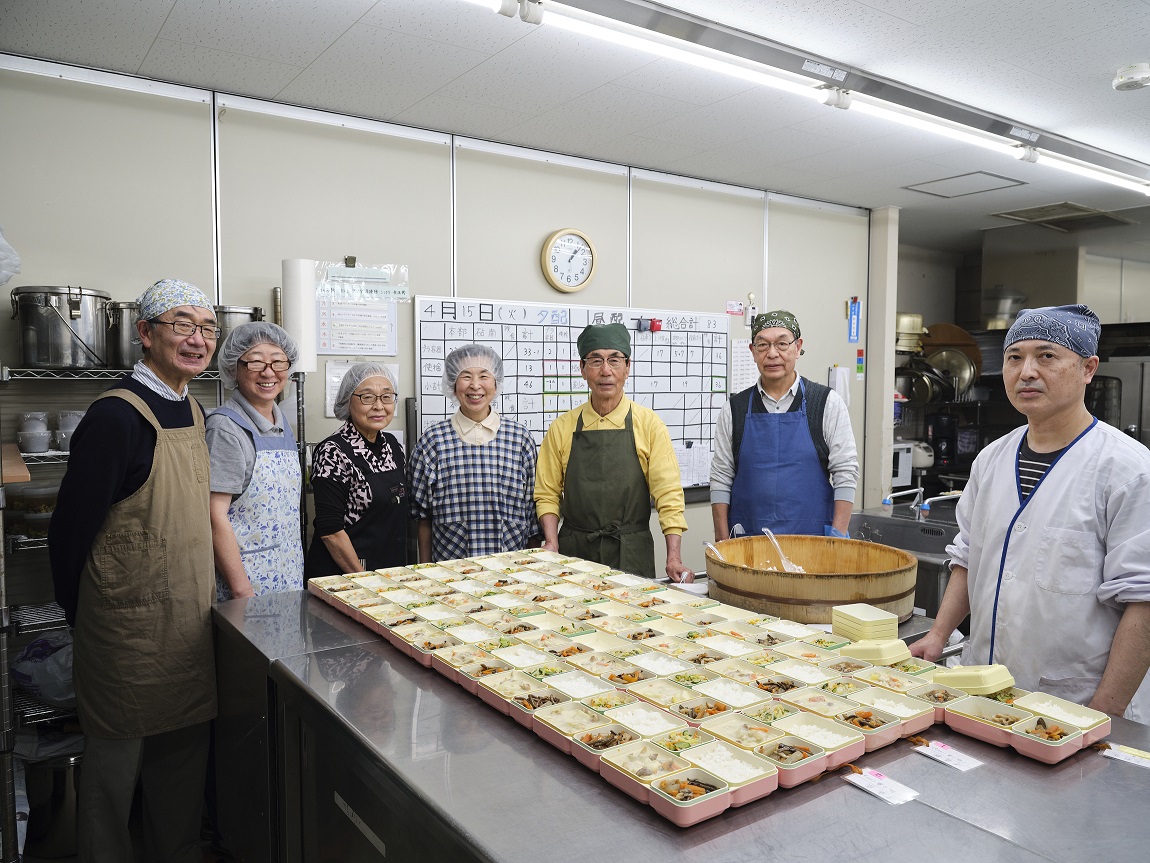
Volunteers at MOWJ's base in Setagaya, Tokyo
Japan-Australia Exchange 40th Anniversary Event Held in 2024
.jpg)
ー Please tell us again about the background and purpose of the 40th anniversary event of the Japan-Australia exchange held in 2024.
With the support of the Australia-Japan Foundation, we celebrated our 40th anniversary in 2024. As part of the 40th anniversary, we carried out various programs. For me, the purpose of this project was to discuss the value of food support and community. Since the COVID-19 pandemic, we have been communicating with MOWSA online. So, we thought the 40th anniversary would be a good opportunity to bring together the issues surrounding providing food support in both countries and share information. The main items are as follows:
.jpg)
1. Study sessions to deepen mutual understanding
Through preliminary study sessions attended by staff from both MOWSA and MOWJ, we deepened our understanding of each country’s systems, social backgrounds, and actual initiatives. During these sessions, we also discussed potential topics for the symposium and roundtable meeting to be held when MOWSA members visit Japan.
2. Roundtable discussions
Representatives from Meals on Wheels in Japan and Australia, government officials, support organizations, researchers, and companies gathered to discuss providing food support and the value of the community. MOWSA board members also participated online, and a video message was shared from the Australian Minister for Aged Care and Seniors. The discussions constructively addressed various themes, such as the importance of nutrition and communication in elderly welfare, community building, measures against loneliness and isolation, volunteer activities, reducing food loss, and collaborating in food support activities.
3. The commemorative symposium for the 40th anniversary
The symposium served as an opportunity for participants, whether they attended in person or online, to deepen their understanding of the activities and challenges of meal delivery services in Japan and Australia, and it also boosted momentum for future exchanges.
4. Exchanges through site visits
Key members of MOWSA who visited Japan toured three activity sites in Setagaya, Tokyo, and Sendai, Miyagi Prefecture, and engaged in exchanges with local groups. At these sites, participants learned from each other about local variations in operations, and they also sampled the delivered meals.
5. Renewing the friendship agreement
A renewed friendship agreement was signed to promote further cooperation and mutual partnerships between Japan and Australia. The agreement, which was an update of the previous agreement, had a new clause that emphasized “promoting international cooperation while respecting each other’s cultural backgrounds.”
.jpg)
Visiting a meal preparation site in Setagaya, Tokyo
Through various discussions held during the 40th anniversary event, we reaffirmed the importance of local communities. In Japan, due to difficulties recruiting volunteers, there is a growing tendency to outsource meal delivery services to private companies. However, this approach raises concerns regarding its long-term sustainability. To ensure the health and well-being of older adults in the community, further growth and collaboration among volunteer organizations are essential. At MOWSA, over 6,500 registered volunteers are still actively involved today. Although volunteer numbers are also reportedly declining in Australia, we believe there is still much to learn from MOWSA’s systems and framework.
Learning the Social Value of Community
— Mr. Hirano, what do you think about the activities of MOWSA?
I remember I was assigned to drive the shuttle car when Mr. Derek Noble, then head of MOWSA, visited Japan in 1985. Before we knew it, we had been in a relationship with MOWSA for more than 40 years! I once visited a MOWSA facility and found its kitchen to be spacious and bright, an ideal environment that fosters productivity and efficiency for volunteers.
.jpg)
I looked into what made it different from Japan, and I learned that the city had leased land for MOWSA’s kitchen for 49 years at a cost of just one dollar. Furthermore, local governments and Rotary Clubs support MOWSA’s activities, and both the South Australian government and the federal government recognize its value and subsidize it. This demonstrates the societal norm of acknowledging and supporting volunteer-led efforts. I see this as a reflection of Australia’s generous society and its values.
In Japan, these kinds of food support services are typically carried out in collaboration with local governments. However, small municipalities often have limited capacity to provide support, and while they can impose regulations, providing subsidies remains difficult. Looking to Australia, where both state and federal governments provide support, I hope we can establish a system in Japan that allows for backing at the national level.
— What have you learned from your long-standing exchanges with MOWSA?
I know I’ve said this before, but the 40 years of exchanges have taught us the social value of community. To help solve the social issues that come with Japan’s ageing population, I hope to share with people across Japan what we’ve learned from Meals on Wheels and the proactive volunteer spirit of Australians.
Building a Platform for Food-Based Support
— What are some of the dreams or goals that MOWJ (National Food Support Activity Cooperation Association) hopes to realize?
We hope to leverage our experience and network to build a cross-sector platform to promote food-based support across regions and industries. The value of local food support activities goes beyond simply providing meals and improving the nutritional status of older people. It also helps prevent isolation and loneliness; it provides a life support; and it contributes to preventing frailty and dependency.
.jpg)
While children’s cafeterias are expanding nationwide, many meal delivery services for older adults are facing shortages in manpower and funding, which threatens the sustainability of food support activities in many communities. To address this issue, it is hoped that stakeholders, such as government agencies, social welfare councils, and community support coordinators, will play a key role in revitalizing local food support efforts.
This will require gathering resources from a wide range of sectors. Therefore, forming organic partnerships with diverse organizations, such as businesses, chambers of commerce, and regional networks beyond the welfare sector, is essential. In that context, collaboration among food support organizations like Meals on Wheels is seen as vital to building a platform for food-based assistance.
Currently, we are working on a system called Meals on Wheels Logistics System (MOWLS), which began during the COVID-19 pandemic, that connects food donations from companies to organizations. Its operations are now being expanded throughout Japan.
MOWLS functions like a pipeline. It comprises 80 large-scale logistics bases and 310 regional hubs, which together distribute donated food to over 2,700 food support organizations nationwide. Through this system, we are expanding a broad food support network, which includes communal dining, meal deliveries, children’s cafeterias, community kitchens, and cooking classes. We hope to strengthen collaborations with Meals on Wheels organizations around the world in order to expand the concept of the value of mutual support through food.
— Lastly, do you have a dream that you would like to realize with MOWSA?
We hope to share the values and activities of Meals on Wheels in Japan and Australia with other organizations across the Pacific Rim. To do that, it would be great to co-host a global MOW conference between Japan and Australia. Ageing is not only an issue in Japan and Australia; it is a global challenge. If we could use such gatherings to share with people around the world the model of community that is offered by Meals on Wheels, that would be ideal.
.jpg)
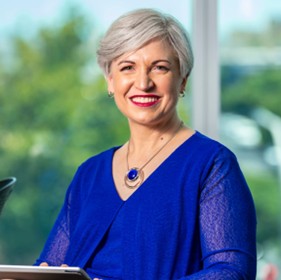
Meals on Wheels South Australia
CEO: Ms. Sharyn Broer
Delivering over One Million Meals a Year and Supporting More than 13,000 Seniors
— Please tell us about the missions and activities of Meals on Wheels South Australia. (MOWSA
Meals on Wheels South Australia is a charitable organisation that began 70 years ago. It was designed to solve the problem of older people entering care homes for the aged because of poor nutrition and loneliness.
We help people to live independently by delivering nutritious meals, providing a social connection, and making sure they're safe at home. Our main activity is our care volunteers taking nourishing and appealing meals to people’s homes around midday and having a short chat with them to make sure they’re safe.
These safe and healthy meals create strong and meaningful connections in the community. Every year, we deliver more than one million meals, helping over 13,000 people. Most of our “customers” are over 85 years old. They pay a contribution toward the service, which supports their health and independence. The amount they pay depends on whether they qualify for federal government support. In Australia, we expect the number of people over 85 to triple in the next 10 years. Like in Japan, our population is also ageing.
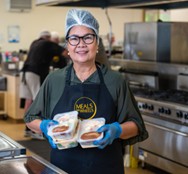
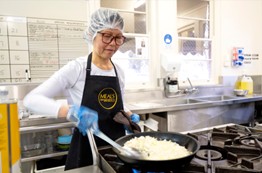
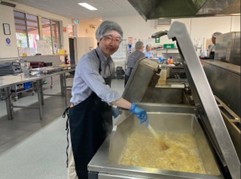
To begin with, Meals on Wheels is a meal service for the elderly. It is believed to have started in the 1940s in the United Kingdom. There are independent Meals on Wheels organisations around Australia that do similar work, but it was South Australia that first started operating. Meals on Wheels South Australia is the largest group, with 84 cooking and delivery branches across the state. Most activities are carried out by volunteers, with more than 6,000 registered volunteers and approximately 150 staff members providing support.
Many of our volunteers are over 70 years old and are retired. They prepare meals using fresh ingredients every morning and deliver them the same day. Other meals are made in our commercial kitchen in Adelaide and then chilled or frozen before being sent to our branches across the state. At these branches, volunteers heat the meals and deliver them. We also prepare special meals for people with swallowing difficulties or allergies. Lately, more people are choosing frozen meals so they can eat them whenever they like.
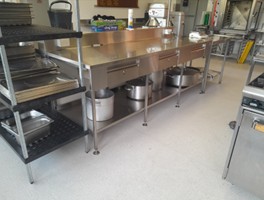
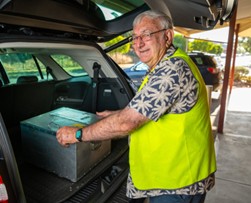
The most crucial aspect of the service is the interaction with the volunteers. It is this that sets Meals on Wheels apart from other organizations. The regular, brief visits create relationships that benefit both volunteers and clients. For example, if a volunteer notices a client has problems, appropriate follow-up can be done. Volunteers have called ambulances in emergencies and have helped save many lives over the years.
MOWSA’s vision is “Create more opportunities for people to come together,” and we offer various other welfare services. These include home visits to chat and share meals with seniors living alone, holding “social meals” in community restaurants or cafes, and running cooking classes for seniors. They also host "social meals" at restaurants and cafes in local communities, as well as cooking classes for the elderly. This has also increased intergenerational interactions with young children and students. This is our service model.

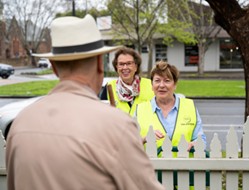
- What is the significance of MOWSA's activities in Japan?
We’re very proud of our 40-year cooperative relationship with Meals on Wheels Japan. Our regular exchanges of ideas and information help both our organisations improve and solve the shared challenges we face as non-profit food support services.
In the early years, Meals on Wheels South Australia’s role in the partnership was to guide and support Meals on Wheels Japan as they developed their activities. But now, we’re both mature organisations, and we continue to share our results and challenges and learn from each other. Doing so, we discover different ways to solve similar problems. It opens our minds far more than just talking with other Australian organisations that do similar work.
Hunger and isolation are global problems, whether a country is rich or poor. Our exchanges give us a great opportunity to think about different ways to tackle not only national-level macro issues, but also community-level challenges. Visiting Japan in 2024 to observe the activities and engage with various stakeholders was incredibly valuable.
Suggestions on How to Enhance Meal Delivery Services in Local Communities in Japan
— I heard that in 2024, MOWSA held an event in Japan with the support of the Australia-Japan Foundation.
In 2024, with support from the Australia-Japan Foundation, we held events to celebrate the 40th anniversary of our cooperation with Meals on Wheels Japan (MOWJ). Four of our key staff visited Japan, engaged with MOWJ representatives, and participated in study sessions, roundtables, and site visits.
In the study sessions, we explored both the similarities and differences in our activities and operational systems. We discussed how meals are prepared and delivered, the extent of government involvement in funding and support, the regulatory environment, and the concept of volunteerism in our countries. We also shared the research that each of our organisations has conducted. We presented our findings on the social impact of meal services, and MOWJ shared its research on innovative food support programs for children and single-parent families. We also discussed opportunities for intergenerational activities.
During our one-week stay, we met with officials from the national and municipal governments of Japan to advocate for more support for Meals on Wheels Japan. We shared the results of our social impact research in Australia to show that Meals on Wheels offers more than just food—it holds real value and is attractive to both government and private investors. We also met with representatives from the Australian Embassy and the Australia-Japan Foundation, which reaffirmed their vital role in building our long-term relationship.
We visited three Meals on Wheels sites in Setagaya, Tokyo, and in Sendai, Miyagi Prefecture, where we observed meal preparation and packing processes. We took part in meal deliveries and had the chance to speak with elderly Japanese customers. We also interacted with volunteers and staff and shared some of the beautifully prepared meals they had made that day.
.jpg)
We joined roundtable discussions with a wide range of stakeholders to exchange views on issues, like ageing societies, loneliness in communities, and partnerships between MOWJ and businesses and foundations. We also held an online symposium linking Japan and Australia, where we presented suggestions for strengthening meal delivery services in Japanese communities.
— In Japan, the decline in the volunteer population has become an issue. Have you noticed any issues through your exchanges with MOWJ?
Yes, I believe it is necessary to educate young generations about the social value of volunteering. It is important to show what volunteering means to being part of society. One thing I learned in Japan is that compared to Australians, Japanese people have fewer opportunities to help strangers or donate money or time.
According to the World Giving Index, over half of Australians have a positive attitude toward such activities, but in Japan, it’s closer to one in five. This may be due to more people, including housewives, working full-time, leaving little time for volunteering. There are also cultural differences in how people use time and help others.
So we need to tell a shared story of how volunteering is valuable for the giver. It’s important to explain what people gain from civic engagement and how it enriches their lives.
For example, stories of teenagers or college students helping seniors can inspire others. If we share how these students gain skills, confidence, and pride from volunteering, it can encourage wider participation.
In Australia, most volunteers are retired. Participating in Meals on Wheels helps them stay physically and mentally active. MOWSA can help build stories within communities that show the value of volunteers.
— How old are the young volunteers who participate in activities at MOWSA?
Most are students aged 18 to 25. Although there are few, they are essential. Some serve as university ambassadors, that is, students who actively promote our work within their communities. Many international students live in Adelaide. Volunteering at MOWSA helps them practice English and learn about society and the environment.
However, we recognize that if students have classes when MOWSA volunteers are delivering meals, they may not be able to help even if they want to. Therefore, we are working to establish more flexible hours of operation. If students can help on weekend mornings or weekday afternoons, it would suit seniors as well.
Impressed by Japan’s Efforts to Tackle Loneliness and Isolation
— Your insights are very helpful for informing Japanese youth about MOWJ’s activities. How do you view the current relationship between Australia and Japan?
I believe Australia and Japan have a strong relationship of mutual respect and cooperation. Our histories and cultures are different, but we share many similarities. Australian cities are much smaller than major Japanese cities. Nevertheless, we are impressed by and have much to learn from national efforts to reduce isolation and loneliness in Japan. We also focus on the role that food can play in addressing this challenge, which is why we feel that the Meals on Wheels service model is so important. That is because it is a mechanism that creates connections between people, not just the delivery or provision of meals.
I believe now is the right time to act. Australians should focus more on the health benefits of addressing isolation and loneliness. I was also impressed by Japan’s national strategies to reduce food waste.
In other aspects, I found that Australia can learn from Japan. Because many people have moved to big cities, rural areas are left with inadequate services and a shrinking workforce. In these areas, elders have difficulty living healthily and independently.
Another major difference I have noticed is that in the Japanese community, people are expected to be much more independent and responsible than people in Australia. And in Japan, it is the community that provides support for the individual. Government activities are seen as the final safety net, not the first line of support as they are in Australia!
In Australian society, there is the expectation that if you become unable to take care of yourself, the government will assist you and provide services. And the services should be provided “for the needs of the individual” rather than “for the benefit of the community” as a whole.
As mentioned earlier, Australians are more likely to help others and donate time and money. While that is great, we also understand that a system that relies on donations and volunteers has challenges for its future sustainability. That’s a major concern for the future of Meals on Wheels.
Nevertheless, we reaffirmed that there is a very positive working relationship between Australia and Japan. I was also impressed by the strong interest expressed by various Japanese stakeholders in how the Meals on Wheels service operates, whether the government is involved, and the opportunities for improvement common to both sides.
Providing Meal Delivery Services in Partnership with Public Hospitals in Rural Areas
— Local communities are essential in both Australia and Japan. Did you notice any differences when observing Japan’s communities?
The state of South Australia includes Adelaide, Greater Adelaide, and the metropolitan area. Eighty percent of the state lives in those areas. And there are hundreds of smaller communities scattered over a very large area of Australia. These areas are also experiencing population decline, but not as rapidly or severely as in some parts of Japan.
In these small communities, people work together to find solutions to their challenges. Often the same people are involved in emergency services, fire relief, the Red Cross, and other charities. They want to stay in the places they were born and raised and live fulfilling lives there.
In South Australia, travel between communities can take hours and is a major burden on activities. Australia lacks high-speed rail and other infrastructure like Japan, so distance is a major challenge.
At MOWSA, while our main operations are in Adelaide, small groups of volunteers in each community are responsible for food distribution. We often collaborate with local public hospitals, where staff prepare meals and volunteers deliver them.
There are challenges in retaining volunteers. For example, because there are so many regulations and rules in Australia governing the provision of government-subsidized food services, they constrain our activities. Assisting the elderly entails strict requirements, such as prior training, and many people who want to help for just one hour a month find the complicated training and compliance procedures burdensome and discouraging. But overcoming these challenges and working with communities is our vital role.
Connecting Senior Support Experience with Meals on Wheels
— What motivated you to get involved with Meals on Wheels? And what is your motivation for the activity?
Thank you for the great question. I’ve been involved with Meals on Wheels for 15 years. Before that, I was trained as an occupational therapist and worked in home and community care in South Australia. Most of my work at that time involved supporting seniors to live healthy and independent lives at home. I deeply value older adults and want them to contribute to society. And I want to see them contribute to society for as long as possible and live meaningful lives with purpose. So I don’t want them confined to institutions.
Joining Meals on Wheels connected my career of supporting seniors to become more independent. Every day, nearly 100 small teams come together to lovingly prepare food and deliver it to people’s homes, bringing them joy, health, and safety. Hearing how our services benefit both recipients and volunteers warms my heart. That’s why I continue to be part of Meals on Wheels.
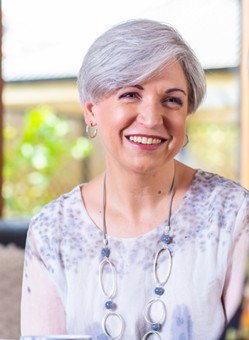
Making Meals on Wheels a Natural Choice in Every Community
— Thank you very much for sharing your story with us. Lastly, what are your goals for MOWSA or your vision in partnership with MOWJ?
In a rapidly ageing society, many people can’t easily shop or prepare meals. If Meals on Wheels fulfills its mission, seniors can live independently, healthily, and socially connected in their own communities. That is our goal, but it will take time.
Nevertheless, it is clear that the Meals on Wheels service model can have a significant impact on the problem of undernourishment and loneliness among the elderly. We are calling for greater government engagement and funding in both countries to support our work in both countries.
The approaches and challenges to reach this goal differ somewhat between Australia and Japan. In Australia, both the public and politicians understand the value of Meals on Wheels and the importance of investing in it. In Australia, Meals on Wheels has very high brand recognition. In fact, 98% of South Australians will name Meals on Wheels when asked who provides meal services for seniors.
That is why we believe that people in Japan should know more about the very important role that MOWJ plays as a platform. MOWJ supports and connects hundreds of small organizations.
MOWJ works with companies, social welfare councils, and three levels of government (national, prefectural, and municipal) I was disappointed to learn that half of Japan’s social welfare councils do not support meal deliveries. That is why we will continue to provide data and insights and encourage MOWJ to continue to deliver meal delivery services to the elderly in all regions of Japan.
The environment in which we operate is somewhat over-regulated in some areas. Seeing Japan’s more flexible systems for nutrition guidelines, food safety, and workplace safety inspired us to explore how to create more resident-focused services in Australia.
I would also like to see the Australian government take a more active role in addressing loneliness and the social and health challenges that result from it. We learned of the enactment in Japan of the Law for the Promotion of Measures to Cope with Loneliness and Isolation, which we regard as a globally progressive policy for preventing and coping with loneliness.
We hope that this law will be understood and accepted in Australia and other Western countries. It is very difficult to admit to being lonely. That is why I feel that having a hot meal and a place to stay, which is supported by a policy, is a very good solution.
.jpg)
We understand well that food connects people. I really like the Japanese saying, “Eat out of the same pot”. We have several common goals. It is about the following: making Meals on Wheels a commonplace option in our communities, addressing more of the issues of loneliness in our society, and understanding the potential of initiatives like volunteerism as a prescription for loneliness.
We will also support MOWJ's mission of connecting small community organizations. Volunteer-led groups that are funded only by a nominal fee paid by seniors are creating great value in their communities. The more support we can garner, the more we can accomplish. We would like to be a part of that activity for a long time.
A special thanks to:
Meals on Wheels South Australia (MOWSA)
South Australia-based elderly food service organization. “Meals on Wheels” is a program that delivers meals to people who are unable to prepare food for themselves. Based on a program that began in the UK in the 1940s, MOWSA delivers over one million meals each year from 84 kitchen and distribution hubs across South Australia. The service, which is used by over 13,000 people, is supported by around 6,000 registered volunteers.
https://mealsonwheelssa.org.au
General Incorporated Association: National Food Support Activity Cooperation Association
Established in 1986 following an exchange with Meals on Wheels South Australia, the association began organizing meal delivery and communal meal services for elderly people living alone. It also serves as the representative body for Meals on Wheels Japan(MOWJ). The association continues to work actively to expand elderly meal services and build a platform for food-based support.
https://mow.jp
